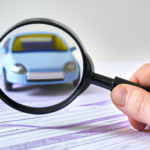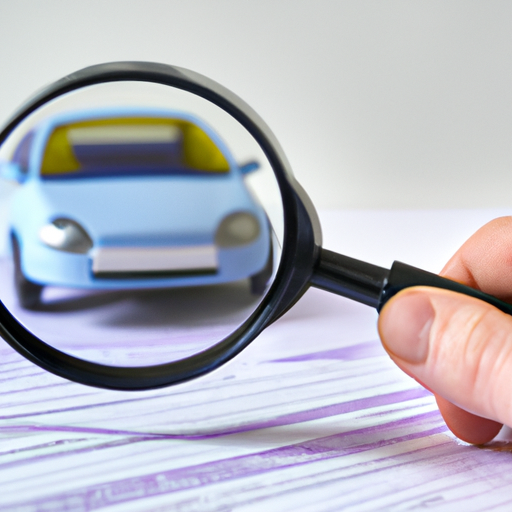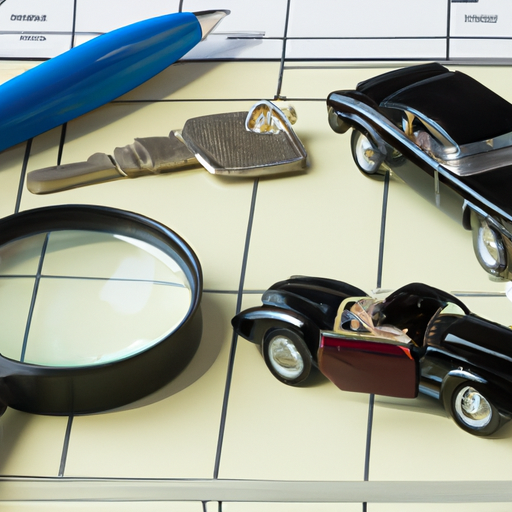Imagine yourself cruising down the open road in your dream car, sun gleaming off its sleek surface, and the purr of the engine resonating in the air. Sounds blissful, doesn’t it? Now, what if we told you that this dream could become a reality with just the click of a button? In the article “Uncovering the Best Ways to Check Vehicle History”, you’re about to embark on a journey that will empower you with the knowledge required to thoroughly inspect a vehicle’s past record before you make that all-important purchase. Thus, ensuring complete transparency and a seamless process of getting behind the wheel of your coveted car. Buckle up and let’s get rolling!
Understanding the Importance of Vehicle History
When it comes to purchasing a used vehicle, it’s important to remember that you’re not only buying a car, but also its past. Herein lies the importance of understanding a vehicle’s history.
Reasons for checking vehicle history
Consider vehicle history as your detective, providing you with crucial leads and clues about what the car has experienced prior to it landing in your hands. From previous accidents, repair and maintenance records, to indications of potential tampering with the odometer, all of this vital information can be uncovered by delving into a vehicle’s history.
How a vehicle’s past affects its current condition
A vehicle’s past profoundly shapes its current condition. For instance, a car that’s been regularly serviced with its components replaced periodically will likely show fewer signs of wear and tear. On the other hand, a vehicle that’s been involved in severe mishaps, suffered periodic maltreatments or undergone improper repairs might carry hidden damages, which may surface after you purchase the car.
Risks associated with not checking vehicle history
Without exploring a vehicle’s history, you’re stepping into potential pitfalls. You could end up purchasing a car that is mechanically flawed, has been stolen or even has outstanding finance attached. Thus, it becomes utterly essential to avoid such risks by going through the vehicle’s past records.
Considerations Before Checking Vehicle History
Before you plunge into the vehicle history checking process, there are a few considerations to keep in mind.
Why the VIN is crucial
The Vehicle Identification Number (VIN) is like the unique fingerprint of a car. This 17 character long code, which includes letters and numbers, provides a wealth of information about the car, including make, model, year of production, and the original equipment manufacturing details.
Determining what information you need
While uncovering vehicle history, it’s important to pinpoint the information that matters most to you. Do you want to know if the car has ever been in a major accident? Are you concerned about any recalls associated with the vehicle? Be clear about what you need to make a well-informed choice.
Understanding Vehicle History Report Limitations
While the vehicle history reports provide significant insights, they’re not foolproof. Some records might be missing, and there’s a chance that some information might not be entirely accurate. It’s prudent to use reports as a guide rather than a definitive verdict.
Free Vehicle History Checking Options
You don’t necessarily have to spend money to peek into a vehicle’s past. There are several free resources at your disposal.
Using the National Insurance Crime Bureau
The National Insurance Crime Bureau (NICB) offers a free service that lets you see if the car has been reported stolen or has any pending claims.
Accessing the National Highway Traffic Safety Administration’s databases
The National Highway Traffic Safety Administration (NHTSA) maintains databases that can provide reports about safety issues, manufacturer recalls, and even crash-test ratings. Accessing them can offer vital insights about a vehicle’s history.
Leveraging state DMV websites for information
Many states’ Department of Motor Vehicles (DMV) websites allow you to access important information about a vehicle’s history, like title details, registration history, and salvage history. All you need is the car’s VIN.
Paid Vehicle History Checking Options
While free vehicle history checking options come in handy, paid services often offer more extensive coverage and provide more details.
Analyzing services like CarFax and AutoCheck
CarFax and AutoCheck are two of the most reputable comprehensive vehicle history checking services. They provide detailed information about title changes, accident history, odometer readings, recalls and much more.
Value-added services provided by paid options
With paid options, you enjoy the benefit of extra features. For instance, CarFax offers a service guarantee that compensates you for any losses you incur if you purchase a vehicle whose negative history their report missed.
Comparing costs and benefits of different providers
Before deciding on a vehicle history checking service, compare the costs and benefits of various providers. Some may charge a one-time fee while others may offer a subscription. Identify your needs, evaluate your budget, and find the right balance of cost and features.
Detailed Insight into CarFax
CarFax is one of the most recognized names in the vehicle history check industry, and for good reason.
Costs associated with CarFax
CarFax offers a few different pricing options – a single report for a one-time fee, or unlimited reports for a month.
Information provided by CarFax
CarFax provides in-depth reports, which include details about title history, odometer readings, accident history, recall information, service records, and more.
Reliability and veracity of CarFax reports
While no report can be 100% foolproof, CarFax is respected for its extensive database and the thoroughness of its reports. However, always remember to compliment it with a physical inspection and a mechanic’s expertise when making a purchase.
Understanding the Services of AutoCheck
AutoCheck is another major player in the vehicle history report spectrum, offering valuable insights about a vehicle’s past.
How AutoCheck works
AutoCheck operates similarly to CarFax. It requires a VIN or license plate number and then generates a comprehensive report based on that.
Types of information catered by AutoCheck
AutoCheck’s reports provide information about accidents, title details, odometer readings, and vehicle usage (like whether it has been used as a rental or fleet vehicle). Also, AutoCheck assigns a score to a vehicle, comparing it to other similar vehicles.
Assessing the accuracy of AutoCheck data
AutoCheck also holds a strong reputation for the accuracy of its data. However, it must be reinforced that no history report is perfect, and all should be correlated with a physical inspection and mechanic’s evaluation.
How to Interact With Vehicle History Reports
Getting a vehicle history report is just the first step. Knowing how to decode and interpret it is equally important.
Interpreting the data in the reports
vehicle history reports can seem complex initially, but with time and understanding, you’ll be able to navigate them like a pro. Look for sections related to title history, accident history, odometer readings and service history. Comparing these sections to what you see during a physical inspection can be immensely helpful.
Decoding the VIN
Understanding each digit of a VIN can provide valuable insights. The first digit represents the country of manufacture, the second stands for the manufacturer, the third is the vehicle type, and so on. There are numerous online resources available to help you decode VINs.
Correlating report data with physical inspection
The data in the reports should align with the vehicle in reality. For instance, if the report says the car was involved in a severe collision, do you see signs of major repair or damage when you view the vehicle? Using the reports to guide your physical inspection can save you from potential pitfalls.
Role of a Mechanic in Vehicle’s History Verification
A skilled mechanic is an invaluable ally in the car buying process.
Why it’s good to have a mechanic verify a vehicle’s history
A mechanic can provide a trained eye that can catch issues you might miss. They’re adept at interpreting history reports, associating data with the physical condition of the vehicle, and sniffing out any mechanical red-flags.
How mechanics use history reports in their inspection
Mechanics use history reports to guide their inspections. If the report denotes an accident, they will scrutinize the related components thoroughly. And if there’s an issue with the title, they may advise an extra level of scrutiny prior to purchase.
Finding trustworthy mechanical verification
Seek a reliable, qualified mechanic or vehicle inspection service. Get referrals from friends, read online reviews, and ensure they are certified in automotive repair or diagnostics.
Red Flags in Vehicle History Reports
With the help of a report, you can watch out for red flags. Here are a few things to look out for.
Signs of past accidents or damage
Severe accidents and damage can have significant implications on the overall performance and safety of a vehicle. Look out for indications of repairs or damage in the history report.
Signs of odometer rollback
Odometer rollback is a common scam where the mileage on a car’s odometer is reduced to increase the vehicle’s sellable value. Confirm the reported mileage in the history report with the vehicle’s odometer.
Indications of previous severe weather damage
Severe weather events like floods can cause irreparable damage to a vehicle. Watch out for signs of salvage or reconstruct titles which may point to severe weather damages.
Ensuring the Authenticity of Vehicle Documents
It’s not just about assessing the vehicle’s physical condition or history, but also verifying the authenticity of the related documents.
Checking for forged documents
Fraudulent VINs, fake service histories, or forged titles are potential red flags and are indicative of scams. Always compare the provided documents to the history report and verify their authenticity.
Verification of legal documents
Ensure that all legal documents associated with the vehicle, like registration, titles, and insurance records, are valid and up-to-date.
Understanding salvaged’ or rebuilt’ titles
Finding “salvage” or “rebuilt” in the title isn’t necessarily bad, but it does mean the car has suffered major damage in the past. Always pursue these vehicles with caution and involve experts in verifying the mechanical reliability.
In conclusion, checking a vehicle’s history is essential when considering purchasing a pre-owned car. Services like CarFax and AutoCheck makes the journey of discovery more manageable. However, always remember to enlist the help of a trusted mechanic and perform your own physical inspection. Happy car hunting!










